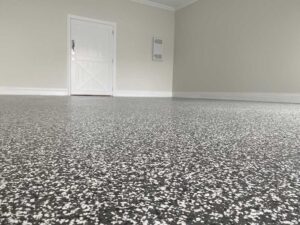Which Is the Better Choice for Industrial Settings?

When it comes to choosing between epoxy flooring and polished concrete for industrial settings, you may find yourself pondering which option aligns best with your priorities. The decision hinges on various factors such as durability, maintenance requirements, and aesthetic preferences. Each flooring type offers distinct advantages, but the ultimate choice depends on what matters most to your industrial environment. As you navigate through the intricacies of epoxy flooring and polished concrete, consider how each can impact the functionality and appearance of your space.
When choosing between epoxy flooring and polished concrete for industrial settings, understanding the key differences is essential to make an informed decision. Epoxy flooring offers a seamless and glossy surface that can transform your workspace into a modern and vibrant environment. The smooth finish of epoxy flooring not only enhances the aesthetic appeal of your space but also provides a protective layer that is resistant to chemicals, stains, and spills. This makes it easier to clean and maintain, ensuring that your industrial setting remains both safe and visually appealing.
On the other hand, polished concrete exudes a more industrial and rugged charm, perfect for environments where durability is crucial. The natural stone look of polished concrete can add a touch of sophistication to your space while maintaining its robustness against heavy equipment and foot traffic. Polished concrete is also a sustainable option as it utilizes the existing concrete slab, reducing the need for additional materials.
Both epoxy flooring and polished concrete have their unique advantages, catering to different preferences and requirements. Whether you prioritize a sleek and modern appearance or a sturdy and resilient surface, understanding these distinctions will help you choose the flooring option that best suits your industrial setting. By considering factors such as aesthetics, maintenance, and durability, you can create a workspace that not only meets your practical needs but also reflects your identity and sense of belonging.
To evaluate the durability and longevity of epoxy flooring and polished concrete in industrial settings, it’s crucial to assess how each material withstands heavy usage and environmental factors. When considering which option is best for your industrial space, keep the following points in mind:
- Resistance to Heavy Traffic: Epoxy flooring is known for its excellent resistance to heavy machinery and foot traffic, making it a durable choice for industrial settings. Polished concrete, while sturdy, may show wear and tear more quickly in high-traffic areas.
- Chemical Resistance: Epoxy flooring offers superior protection against chemical spills and stains, maintaining its quality over time. Polished concrete, on the other hand, can be more susceptible to damage from certain chemicals if not properly sealed.
- Impact Resistance: Epoxy coatings provide a level of impact resistance that can help prevent damage from dropped tools or equipment. Polished concrete, although hard, may be more prone to chipping or cracking upon impact.
- Long-Term Maintenance: Epoxy flooring typically requires periodic resealing to maintain its protective properties, while polished concrete may need regular polishing to keep its shine. Consider the long-term maintenance requirements of each option when making your decision.
For industrial settings, the aesthetic appeal of epoxy flooring and polished concrete plays a key role in determining the overall visual impact of the space. When it comes to creating a workspace that fosters a sense of belonging and pride among employees, the appearance of the flooring is paramount. Epoxy flooring offers a wide range of color options, from bold and vibrant hues to more subdued tones, allowing you to choose a look that resonates with your company’s identity. The glossy finish of epoxy can give your industrial space a modern and sleek feel, elevating the overall atmosphere.
Considering the demands of upkeep in an industrial setting, ensuring the longevity and durability of your flooring choice is crucial. When it comes to maintenance requirements, both epoxy flooring and polished concrete have their pros and cons. Here are some key points to consider:
- Regular Cleaning: Epoxy flooring requires routine cleaning with mild detergents to maintain its shine, while polished concrete needs regular sweeping and occasional damp mopping to remove debris and stains effectively.
- Resealing Frequency: Epoxy floors typically need to be resealed every 2-3 years to maintain their protective layer, whereas polished concrete may require resealing every 3-5 years, depending on the traffic intensity.
- Repairs: In terms of repairs, epoxy flooring can be more challenging to fix as any damages often require professional intervention, while polished concrete can be easily patched or re-polished in specific areas as needed.
- Chemical Resistance: Epoxy floors offer better resistance to chemicals and oils, making them suitable for environments with high chemical exposure, whereas polished concrete may require more care to prevent staining from harsh substances.
Understanding these maintenance aspects can help you make an informed decision based on your industrial setting’s specific needs and priorities. Choose the flooring option that aligns best with your maintenance capabilities and requirements for a durable and long-lasting solution.
When choosing between epoxy flooring and polished concrete for industrial settings, consider the specific needs of the space. Epoxy flooring offers exceptional durability and a modern aesthetic, while polished concrete exudes an industrial-chic vibe. Both options have their unique benefits, so it ultimately comes down to what will work best for the specific requirements of the environment. Make the decision based on durability, aesthetic appeal, and maintenance needs to ensure the best choice for the industrial setting.
